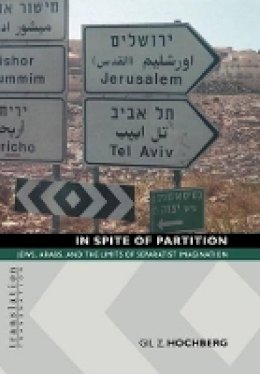
Stock image for illustration purposes only - book cover, edition or condition may vary.
In Spite of Partition: Jews, Arabs, and the Limits of Separatist Imagination
Gil Z. Hochberg
€ 78.33
FREE Delivery in Ireland
Description for In Spite of Partition: Jews, Arabs, and the Limits of Separatist Imagination
Hardback. Challenging the widespread 'separatist imagination' behind partition, this book demonstrates the ways in which works of Jewish and Arab literature reject simple notions of separatism and instead display configurations of identity that emphasize the presence of alterity within the self - the Jew within the Arab, and the Arab within the Jew. Series: Translation/Transnation. Num Pages: 208 pages, black & white illustrations. BIC Classification: 1FB; JFSL; JPFN. Category: (P) Professional & Vocational; (U) Tertiary Education (US: College). Dimension: 229 x 152 x 15. Weight in Grams: 428.
Partition--the idea of separating Jews and Arabs along ethnic or national lines--is a legacy at least as old as the Zionist-Palestinian conflict. Challenging the widespread "separatist imagination" behind partition, Gil Hochberg demonstrates the ways in which works of contemporary Jewish and Arab literature reject simple notions of separatism and instead display complex configurations of identity that emphasize the presence of alterity within the self--the Jew within the Arab, and the Arab within the Jew. In Spite of Partition examines Hebrew, Arabic, and French works that are largely unknown to English readers to reveal how, far from being independent, the signifiers "Jew" and "Arab" are inseparable. In a series of original close readings, Hochberg analyzes fascinating examples of such inseparability. In the Palestinian writer Anton Shammas's Hebrew novel Arabesques, the Israeli and Palestinian protagonists are a "schizophrenic pair" who "have not yet decided who is the ventriloquist of whom." And in the Moroccan Jewish writer Albert Swissa's Hebrew novel Aqud, the Moroccan-Israeli main character's identity is uneasily located between the "Moroccan Muslim boy he could have been" and the "Jewish Israeli boy he has become." Other examples draw attention to the intricate linguistic proximity of Hebrew and Arabic, the historical link between the traumatic memories of the Jewish Holocaust and the Palestinian Nakbah, and the libidinal ties that bind Jews and Arabs despite, or even because of, their current animosity.
Product Details
Format
Hardback
Publication date
2007
Publisher
Princeton University Press United States
Number of pages
210
Condition
New
Series
Translation/Transnation
Number of Pages
208
Place of Publication
New Jersey, United States
ISBN
9780691128757
SKU
V9780691128757
Shipping Time
Usually ships in 15 to 20 working days
Ref
99-15
About Gil Z. Hochberg
Gil Z. Hochberg is assistant professor of comparative literature at the University of California, Los Angeles.
Reviews for In Spite of Partition: Jews, Arabs, and the Limits of Separatist Imagination
"This is a necessary and timely book written in luminous prose... In Spite of Partition offers readers contagiously exciting and productive readings that will surely stimulate future discussions, not only of the literary works themselves, but for thinking more creatively about ethnicity, identity, and shared histories and forms of belonging in this woefully unpromising first decade of the twenty-first century."
Ranen Omer-Sherman, Shofar "This new addition is a thoughtful, well-researched, and carefully constructed argument about the nature of the relationship between Arab and Jew, in its many apparitions and configurations. As such, it is an important addition to the progressive discourse around the future, as well as the past, of Palestine."
Gil Anidjar, Journal of Palestine Studies
Ranen Omer-Sherman, Shofar "This new addition is a thoughtful, well-researched, and carefully constructed argument about the nature of the relationship between Arab and Jew, in its many apparitions and configurations. As such, it is an important addition to the progressive discourse around the future, as well as the past, of Palestine."
Gil Anidjar, Journal of Palestine Studies
